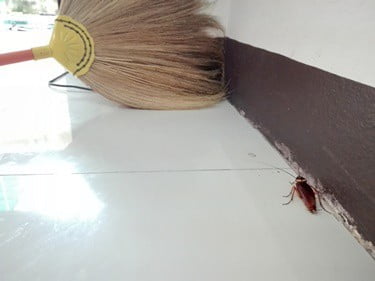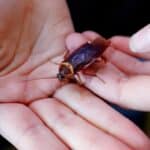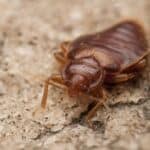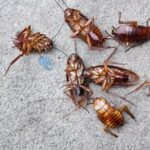It’s natural to assume that a cockroach population will die off or move out when you vacate your property. After all, how will roaches survive without access to leftover food, crumbs, dirty plates, and water? Unfortunately, a roach population won’t go away just because you’ve moved out for a few months. They’re very resourceful creatures.
Cockroaches are versatile insects that will quickly adapt to living in an empty house. They will eat all types of organic matter, including sugary, starchy foods and meat. Cockroaches will also eat starch-based paint, paper, cardboard, and wallpaper paste. Roaches won’t leave a vacant home unless the food supply completely runs out. As roaches will feed on nymphs or dead and dying roaches, they’re unlikely to starve.
What’s more likely than a roach colony leaving a home is that they will widen their food search, using your vacated home as a base for warmth and shelter. They can easily get through holes and gaps, so they will forage in your yard and the outdoor trash cans of neighbors to find food and water.
How Long Can Cockroaches Live in A Vacant House?
Cockroaches don’t require much food to survive and can live for a month without sustenance. As long as there is enough water to keep them hydrated, they will thrive.
Empty houses often have unexpected water leaks and spillages. Even the condensation from windows can provide enough water for cockroaches to stay alive. When no one is home to keep an eye on new leaks, cockroach infestations can form without homeowners suspecting them.
Also, the food supply is unlikely to dry up as long as the intrusion keeps growing. This is because adult roaches feast upon eggs and young nymphs to control the population’s size when no other food source is available.
Female roaches produce eggs without fertilization, so cannibalism keeps the colony sustained. However, these cannibalistic traits are just a survival technique. Roaches will consume other organic foods if they can find them first.
Therefore, cockroaches will live in a vacant house indefinitely unless action is taken to remove them. This is what makes them such tough and hardy creatures, and it’s also why empty homes should be checked on regularly.
Will Cockroaches Leave If There’s No Food?
It’s unlikely that cockroaches will ever run out of food. There’s too much organic matter inside a home for them to eat, even if the property has been vacated.
Cold-blooded creatures take on the temperature of their surroundings. When it’s cold, they go into hibernation. When it’s warm, the climate allows them to become more active without the need for food.
Without food, cockroaches keep their body temperature as low as possible to conserve energy. Doing so allows them to go for extended periods without eating.
However, because cockroaches can only survive a week without water, they prefer to dwell in humid or moisture-rich homes. They also commonly live in bathrooms and kitchens where water is abundant.
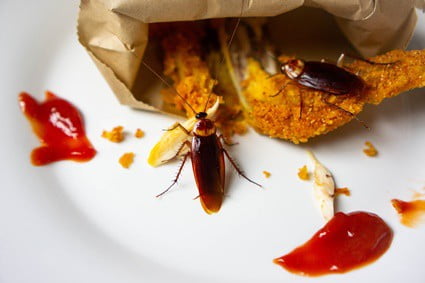
What Do Cockroaches Feed On?
Cockroaches are omnivores, which means they eat animals and plants. When it comes to food, cockroaches aren’t picky about what they’ll eat and consume anything digestible.
Roaches prefer to eat sweets, starches, and animal proteins, as well as greasy foods, cheese, and moldy or fermented foods. Cockroaches spend most of their time in the kitchen, where these foods are abundant.
However, in an empty home, it’s harder for cockroaches to find organic food sources. The International Journal of Scientific Research report describes how cockroaches will eat anything when hungry. This includes starch-based paints, wallpaper paste, envelope glue, and soaps, all of which contain carbohydrates.
Paint
Cockroaches will eat paint as long as it is starch-based. As described by Science Daily, starch-based paints are becoming more widely used as a sustainable and cost-effective product for pocket-conscious homeowners.
Because cockroaches can digest cellulose, they will even eat books, discarded pizza boxes, wallpaper paste, glue on the back of stamps, and paper bags. All contain starch, which is a nutritious food source that provides carbohydrates that fuel roaches and keeps them alive.
Decaying Food
Decaying food is a favorite of cockroaches as it contains all the essential nutrients they need to survive, including protein, sugar, and starch.
Decaying food can also be found down the back of kitchen cupboards and in the fridge. Roaches will feast on liquids that have dripped down the back of a drawer or door. While strong-smelling rotten foods repel humans, they attract roaches and alert them that food is nearby. Roaches can even bite through tinfoil to reach food.
Decaying plants and leaves make a good food source for cockroaches, meaning that roaches have access to plenty of food if the empty house has an abandoned yard.
Waste
Food waste makes up a large part of a cockroach’s diet. Cockroaches love human food and will feast on anything greasy or fermented. Roaches will eat any waste they can find, especially if they have easy access to it.
Empty homes with rotting food are attractive to roaches. If a bin has been left with food inside, roaches are more likely to infest the house. And once they do, they’re difficult to get rid of.
Feces
Cockroaches will eat animal droppings. As an organic substance, feces provides vital nutrients and energy. And the truth is, cockroaches don’t see feces like we do and lack the brain capacity to see poop as disgusting.
Empty houses attract mice, birds, and other small animals. Cockroaches can live in harmony with these creatures by hiding from them in small cracks and gaps while feasting on their droppings to stay alive.
Food
Female German cockroaches can lay up to 384 eggs in their lifetime, so overpopulation is common. This limits the amount of food available, so younger nymph roaches and eggs are often the first to be eaten.
Cockroaches will also eat dead, dying, or wounded roaches when food is scarce. However, many homeowners and renters use these cannibalistic tendencies as an effective way to destroy roach colonies. If a cockroach eats poisoned bait, those feasting on the roach will also fall victim, eliminating the entire colony.
Regulation
Cockroaches self-regulate and eliminate weaker, younger members of the population if there isn’t enough food to go around. Female roaches will even consume nymphs and eggs when food is scarce. This means there are fewer mouths to feed and a greater chance of survival.
To avoid cannibalism, German cockroach nymphs have developed a pheromone that repels adult roaches. They also forage for food in the daytime to avoid adult roaches that forage at night.
Will Cockroaches Go Away on Their Own?
Cockroaches spend most of their time foraging for food and will only go away on their own if the food supply runs out. However, this is unlikely, given that there are many available foods for cockroaches to live on.
Cockroaches breed and multiply fast. Female roaches can give birth to up to 60 offspring at a time, making an infestation hard to eradicate. Females don’t reproduce in the usual way but can produce eggs without fertilization.
This means that roaches are likely to remain in a warm, humid home where they can sustain their population. Even if a few roaches disperse from the house, most will survive on what they find in the property.
How To Keep Roaches Out of An Empty Home
If you know your house will be empty for an extended period, do everything you can to prevent cockroaches from coming in. It won’t be easy, given that cockroaches are small and agile, but it is possible using these steps:
Keep Everything Clean
Sanitize all surfaces, including the kitchen sides, bathrooms, plugs, and floors, to remove any grains of food and water spillages. Cockroaches can find even the tiniest traces of foods – the smells will attract them.
Wipe down the backs of cupboards too. These hard-to-reach areas are where cockroaches are likely to hide, so don’t miss a single part of your home when you clean it.
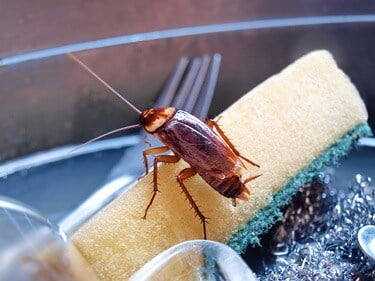
Check for Leaks
Cockroaches need access to water to survive. Oriental cockroaches, in particular, thrive in wet environments and live in bathrooms where they have easy access to water.
Water leaks provide the ideal environment for most household cockroaches, so you’ll need to check under every sink and heating system to ensure everything is bone dry.
Also, check your washing machine, dishwasher, and any other appliance that requires water. If you find a leak, don’t leave it, or you’re at risk of an infestation.
Clear All Rubbish
Cockroaches will eat anything starchy, including paper and cardboard – common household trash. Therefore, bin all paper-based garbage and keep important documents safely stored away where cockroaches can’t get to them. Also, clear out all garbage bins and give them a deep clean to remove any traces of food waste.
Seal All Cracks
To prevent cockroaches from getting into your home, seal all gaps, cracks, and holes. Silicone caulk is one of the most effective substances and lasts for up to 20 years.
Seal all doors, as this is the easiest way for cockroaches to get into the home. You can do this by applying a sturdy aluminum or steel threshold to the bottom. Combining one with a door sweep offers maximum cockroach protection and stops them from gaining access.
Cockroaches can use even the tiniest cracks. If a thin pencil can fit through, cockroaches can too. Check for cracks and gaps during the day when you can see these points of entrance most easily.
Repel Cockroaches
Borax (sodium borate) is a powdery white substance that doubles as an effective cockroach killer. It damages the digestive system and the outer skeleton of pests that consume the substance, killing cockroaches quickly.
While you’re away from your home, put some borax powder down the back of your cabinets and underneath, if you have access. Mixing it with sugar encourages roaches to eat the powder.
Cockroaches won’t vacate an empty house as there are always things available to sustain them inside and outside. Focus on eradicating the colony and future-proofing the home so that it doesn’t happen again.
